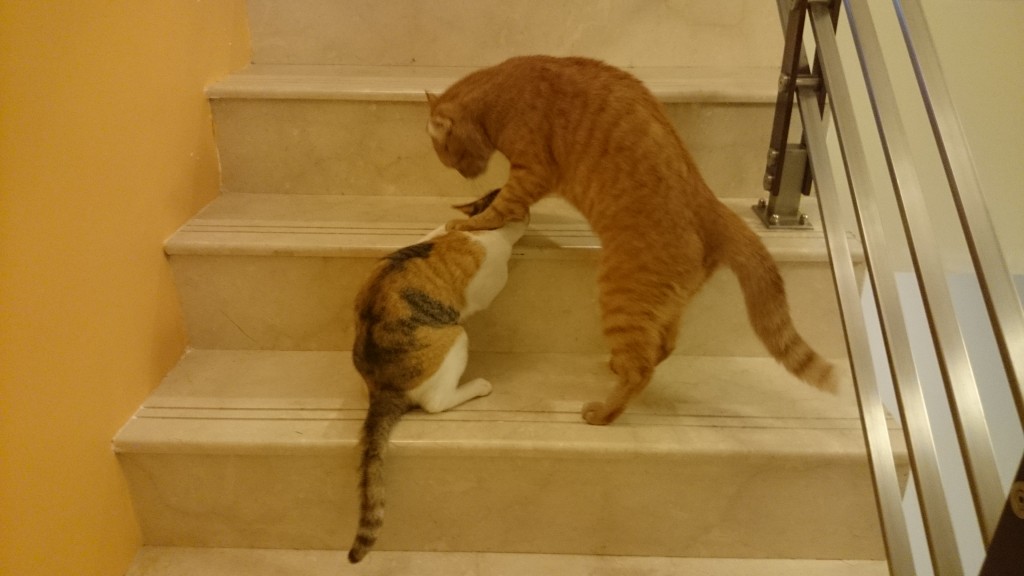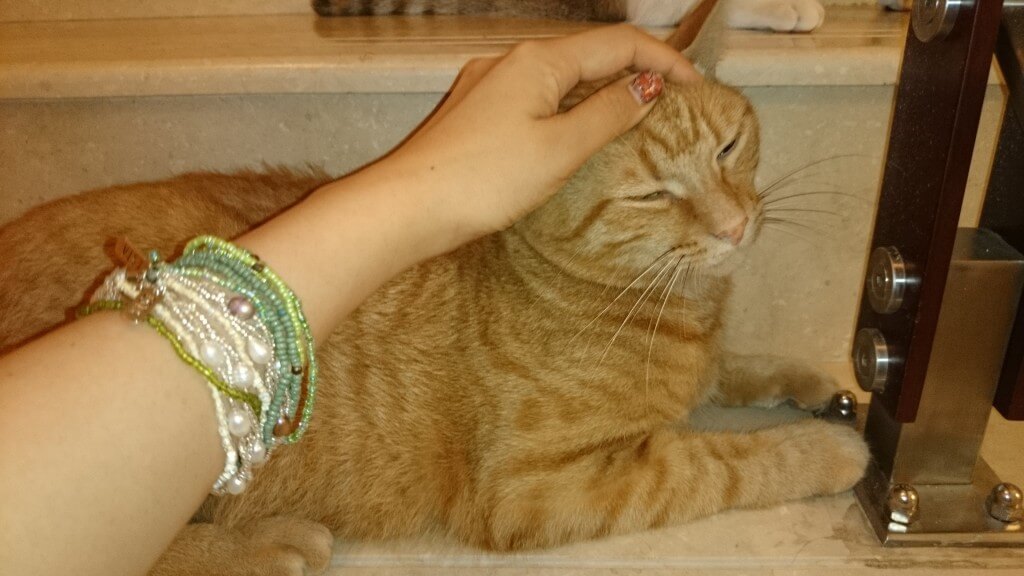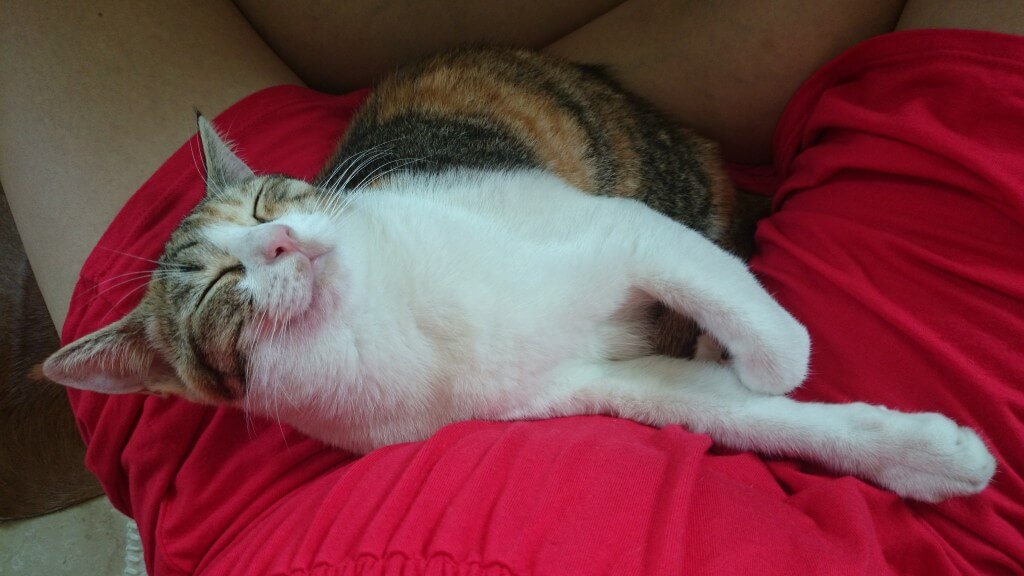Lifestyle
9 Things I Learned From Cats About Relationships
This week (Sept 24 to Oct 1), I am on my fourth of four personal retreats in Bangsar, Kuala Lumpur in Malaysia. Read my previous posts about why I am on a personal retreat, why I cried coming up from Singapore, what’s in my grocery bag and my rain dance!
I am fortunate in being able to retreat in a beautiful space in exchange for cat-sitting service. I found out about and paid to be listed as a house-sitter on TrustedHouseSitters.com. Now if I can go from being afraid of cats, to staying with, and being trusted by them, you can too! Check out how I overcame my fear of cats here.
There is a saying that cats have nine lives. Inspired by my two wards, I like to share nine things I learned from cats about relationships this week:
1) Take Care Of Yourself
Cats spend an inordinate amount of time each day sleeping. Apparently, cats sleep an average of 15 hours a day, and some can sleep up to 20 hours in a 24 hour period. It is true since as soon as Padstow and Bangsar are done with breakfast, they are winding down for a long day of slumber. The house is quietest in the mornings before they come alive again between dusk and dawn.
How many people do you know neglect proper rest or sacrifice sleep? Often, it’s not even due to work! Are you guilty of wasting time on Facebook? Or online games? Perhaps you are burning the midnight oil at both ends – sleeping late and waking early, feeling grumpy, ill of sorts and counting the hours till the weekend?
Well, it’s pretty basic. People who don’t have enough rest don’t perform at their optimal level – and also don’t feel like having sex. Are you taking care of yourself – before you try to take care of others?
2) Enjoy Your Food
If there is one thing, the cats won’t miss: it’s their food. Once they hear me opening the cupboard to their food, they come racing towards me. If they don’t, I know they’d want me to call out to them. Bangsar wolfs her food down, while Padstow licks before tentatively chewing hers down. Yet no matter how greedy Bangsar is, she will never eat more than she needs – even if she manages to get to Padstow’s share.
I know some people who mistakenly perceive quantity food as quality eating, who devour vs. savour, or who constantly over-indulge in food and then justify their behavior. All I am saying is that there is a difference between healthy eating and senseless gorging – and none of it has anything to do with weight.
I have not been a food-lover most of my life – consequently suffering from chronic constipation and stomache bloatedness. I’ve recently learned that I am gluten intolerant and am having a new relationship with food and my body. Food can be a practice on consciousness all by itself. Through food, we can practice mindfulness, appreciation, gratitude, joy and even ecstasy! What’s your relationship with food?
3) Live in the Moment
Cats don’t lose sleep over sleep, or worry about their next meal. They certainly don’t seem to be pondering over some deep philosophical truth like the meaning of life. They just are living – moment by moment. If I bet a million dollars on what they’re thinking at any given moment – short of what they have right infront of them, I’m guessing it’s nothing.
I know of people who are stressed, repressed, and depressed. They are usually over-thinking, over-analysing and over-doing just about everything. They are relentless on others and especially on themselves. Live in the moment. What’s that?
Meditate? How?
Try. I can’t do that! I’ve never done it before!
Do you want to control your thoughts, or are your thoughts controlling your life?
4) Stay Sharp
Did you know that cats are natural explorers and are constantly on a quest for the unknown? Bangsar and Padstow certainly tried to sniff everything I was eating, as well as get into whatever I was using or touching. In addition, cats have an innate righting reflex as it falls in order to land on its feet. Cats have a natural urge to scratch: the action helps them remove old material from their claws, and they mark territory with scent glands in their paws. More than once, Bangsar used her claws on me – for fun. What’s might be funny to her certainly isn’t to me!
Growing up, I was known to be quite a terror. Well meaning friends and relatives would tell me that I need to “control” my temper but nobody ever taught me how. Back then, I couldn’t help how I felt and how I hurt others, so I became afraid of my temper. It was only when I began my journey of inner work that I realised I was so focused on reducing my dark/ shadow side that I didn’t realise that working on my light side was important. The more compassion I developed, the less out-of-control episodes I experienced. The more self-acceptance I felt, the more the positive sides of my temper emerged (which often was righteous anger). My temper finally became my tool, my edge, my claws – and I now call upon it when needed through lenses of compassion.
Are you quick on your feet? Is your mind open, curious and nimble? And if called upon to be used in an emergency or crisis, are your claws sharp?
5) Get Along
Each day, Padstow and Bangsar have their share of tiffs or play-fighting. Each, however, lives to tell the tale. The naughtier Bangsar seems to be the one provoking and winning all the time, until you see how zen Padstow gets back in her own way. And while Bangsar often steals Padstow’s food, it took me a while to realise that it was more a matter of Padstow letting her. When Bangsar was in heat during my first visit, I saw how Padstow tried to comfort her, including offer her own share of food. That’s comradery for you!
For a long time, I didn’t like and consequently didn’t try to do small talk – believing it frivolous and useless. I had a mind-shift when I brought my attention to the needs of the people I sought to connect with, and recognised that small talk was what they needed to build rapport, and trust. It wasn’t until yesterday that Bangsar trusted me enough to curl up asleep on my lap. Small victories!
Are you a leader or team player? How comfortable are you with small talk? Are you able to get along with people?
6) Ask for what You Need
Cats can’t speak, but they know how to ask for what they need or want through non-verbal communication cues and signals. I have a routine of meditating in the morning. I would fed the cats first before settling into a designated chair to meditate. Now three days in a row, the cats would poke at me trying to draw my attention. Am I ok? Am I asleep? And why am I ignoring with them?
Since we can speak, then why are there still misunderstandings? Lots of couples communicate but they do not seem to be communicating effectively. One of the things that consistently come up is that couples do not ask for what they need, want or desire from their partner. Even people who are perfectly articulate seem to have difficulties with this: Asking.
Is it true that the asking with relation to sex and intimacy is any more different than any other kind of asking? It appears that sex has become the elephant in the bedroom. Here are two of my articles which migh be useful about talking about sex in the bedroom – part 1 and part 2.
7) Different Strokes for Different Folks
Bangsar and Padstow have different personalities. Zen Padstow is slower to warm up to strangers, but no less loving. Bangsar was already checking me out in my bedroom the first night I arrived. Bangsar eats faster. Padstow is subtle – less is more. As such, I interact with the cats differently as well.
How many parents treat and discipline their children the same way? Is fair really fair since they are two completely different kids? I know I was crying even before I was caned growing up, while my sister remained calm on the outside. Don’t cry, she’d advice me. It’d pass more quickly if you don’t. I never could not cry. I was traumatised – feeling the pain of the cane on my body before it would even strike me. I didn’t know what I know now – I am kinesthetic and I feel the world through my body in a way that perhaps my sister never did.
Are you more Visual (sight), Auditory (sound), Kinesthetic (touch), Olfactory (smell) or Gustatory (taste)? It’s not enough to know about oneself. How about the natural tendencies and preferances of your partner, loved ones, or children? More here. How about their innate love language? More here.
8) Pay Attention to Boundaries
Cats can’t speak, but they are effective communicators. They recognise their names, and usually come if you call them. More than that, they do know about boundaries. They may not understand what exactly what you say (meaning), but definitely the way you say them (tone). Bangsor certainly knew when I was more shocked than in pain when she scratched me. No, Bangsar! Stop that! Enough! She knew… alright.
It amazes me how many people do not discuss relationship boundaries, much less parameters in the bedroom. The concept of authentic consent and the need for compromise and negotiation does not occur to many. They leave their voice at their door, fearing that speaking up would spoil the mood. He/ she should know what to do. If he/ she loves me, they will just know. Only idiots won’t know.… Such beliefs get nobody anywhere.
Conversations around no are important, because when you have it out in the open – when it’s been clearly communicated; then safety, trust, opening, receiving and surrender can happen – in profound ways.
9) Follow Your Ecstasy
As a sexologist, it fascinates me to no end that a simple thing like scratching a cat at their pleasure spots – top of their head, or under their chin, seemed to be bring it into an altered state of pleasure. This cat looks orgasmic! They know what they like, and how they enjoy being touched. They would shift their bodies, angle themselves, push or brush against you in ways that feels good to them. Nothing matters – after sleep, and food – to pleasure. It feels good to give and it feels great when you get it right, because you are duly rewarded with their undescribled looks of bliss.
Men and women who have difficulties with ejaculation or orgasm would do well taking the time to be first comfortable with their bodies, allowing themselves the time to self-pleasure, and following what feels naturally good and letting it expand. For when we are relaxed and connected with our sexuality can truly ecstatic experiences begin to emerge – slowly at first, then easier over time, and then one day… it is there for the taking… all the time. Out-of-this-world, blow-minding, and knock-your-socks-off moments are possible – if you only start.
Do you follow your bliss? Is it important to you? What do you do to feed your joy or pleasure on a daily basis?
There you have it: the nine things I learned about relationships through cats. Did I miss anything out? Let me know! I want to hear from you below!
I like to invite you to view:
- How I rediscovered my love for the rain here.
- How I overcame my fear of cats here.
- What’s in the groceries bag of an Eco-sexual here?
- Find out why I cried on the bus on my way up to K.L. here.
- Read my previous post about the first of my 4th week-long retreat here.
- Check out how you can run a self-retreat here!
This article and all associated images have been republished with permission from Dr Martha Tara Lee.
Please visit Dr Martha Tara Lee’s website to view original post and more of Dr Martha’s work.
Join SimplySxy’s forum discussions now on Society
Do not miss another article on SimplySxy! Follow us on Facebook and Twitter for our latest updates!
Dr Martha Tara Lee is Clinical Sexologist of Eros Coaching in Singapore. She holds a Doctorate in Human Sexuality from Institute for Advanced Study of Human Sexuality as well as certificates in practical counselling, life coaching and sex therapy. She is available to provide sexuality and intimacy coaching for individuals and couples, conduct sexual education workshops and speak at public events in Asia and beyond.
Get in touch with Martha via email at drmarthalee@eroscoaching.com





































